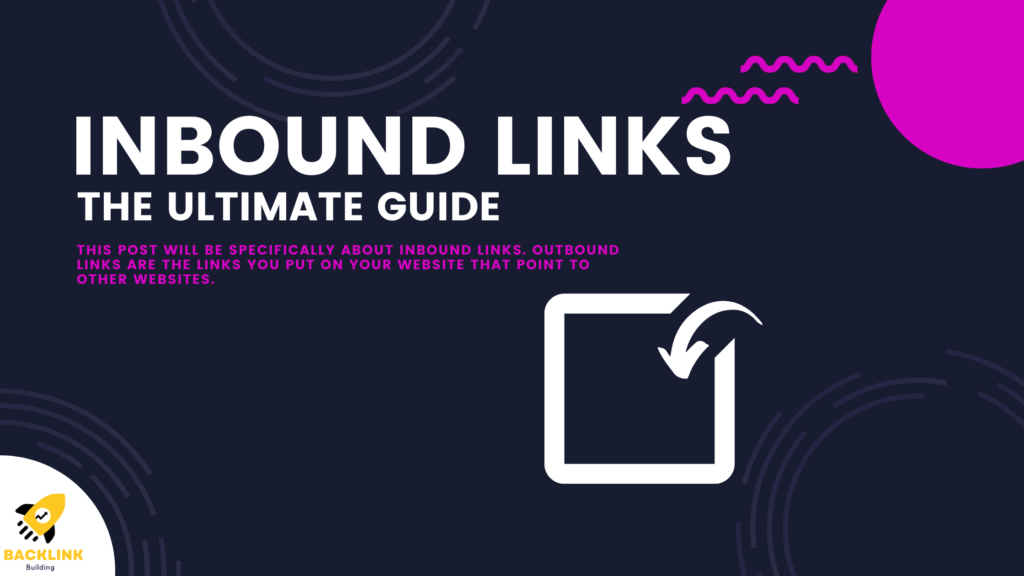
Inbound links, or backlinks, are hyperlinks from one website to another. High-quality inbound links are critical in SEO, impacting a website’s rankings and visibility. Understanding their importance and how to strategize their acquisition can significantly boost your online presence.
This guide explores the strategies, types, and overall significance of inbound links, providing a comprehensive understanding to enhance your SEO efforts.
What Are Inbound Links?
Inbound links, or backlinks, are hyperlinks from one website that lead to a page on another. For example, if a popular blog includes a link to your website in one of its articles, that’s an inbound link to your site.
These links are essential because they vote for confidence from one site to another. Search engines, notably Google, use these links to gauge the credibility and authority of a site. The more high-quality inbound links a site has, the more likely it is to rank higher in search engine results.
Importance of Inbound Links
Here are the several reasons:
- SEO Ranking: Search engines use inbound links as a primary factor in their ranking algorithms. Sites with numerous high-quality inbound links tend to rank higher because these links signal trust and authority.
- Traffic Generation: Inbound links can drive significant referral traffic to your site. When reputable sites link to you, their audience may follow the link to your site, increasing your visitor numbers.
- Brand Visibility and Recognition: Being linked by authoritative sites can enhance your brand’s visibility and recognition within your industry.
- Domain Authority: Inbound links contribute to your site’s domain authority, a metric that predicts how well a website will rank on SERPs. High domain authority generally correlates with higher search rankings.
- Networking and Relationships: Acquiring inbound links often involves building relationships with other businesses and influencers in your industry, fostering a network that can benefit various aspects of your business.
Types of Inbound Links
Understanding the different types is crucial for effective link-building strategies:
- Natural Links: These are links given voluntarily by other websites that find your content valuable. Natural links are the most desirable as they are earned without direct effort from the site owner.
- Manual Links: This is acquired through deliberate actions, such as outreach to bloggers or influencers, requesting them to link to your content. This type involves significant effort but can yield high-quality backlinks.
- Self-Created Links: These include links created by adding your website link to directories, forums, comment sections, or social media profiles. While easy to obtain, they are often less valuable and can sometimes be considered spammy if overused.
- Editorial Links: These are links placed within the content by the publisher, usually because they find the content genuinely useful for their readers. Editorial links are precious due to their organic nature.
Strategies For Acquiring High-Quality Inbound Links
High-quality links from reputable, authoritative websites are far more valuable than numerous low-quality links. Here are some effective strategies:
1. Create Exceptional Content
The foundation of any link-building strategy is creating high-quality, valuable content that others naturally want to link to. It includes:
- Informative Blog Posts: In-depth articles that provide valuable insights, data, and solutions to problems can attract links from other bloggers and websites.
- Original Research and Data: Conducting original research and publishing your findings can attract links from other sites referencing your data.
- Infographics and Visual Content: Visually appealing content like infographics can be highly shareable and link-worthy.
- Case Studies and Testimonials: Detailed case studies highlighting your successes and methods can attract links from industry peers.
2. Guest Blogging
Writing guest posts for reputable sites in your industry is an effective way to build high-quality inbound links. When you contribute valuable content to another site, you typically get the opportunity to include a link back to your site in your author bio or within the content itself.
3. Build Relationships and Network
Networking with other industry leaders and influencers can naturally lead to inbound links. Engage with others on social media, attend industry conferences, and participate in online forums and communities. Building genuine relationships can increase the likelihood of others linking to your content.
4. Leverage Social Media
Promote your content on social media platforms to increase its visibility. When more people see and engage with your content, there’s a higher chance that they will link to it from their sites or blogs.
5. Utilize Broken Link Building
Broken link building involves finding broken links on other websites and suggesting your content as a replacement. This strategy can be highly effective because it helps the website owner fix a broken link while you gain an inbound link.
6. Create Linkable Assets
Developing specific types of content known as linkable assets can attract inbound links. These assets can include comprehensive guides, tools, templates, and evergreen content that remain relevant over time.
7. Participate in Industry Roundups
Many websites feature regular roundups of industry news, trends, or expert opinions. Participating in these roundups by contributing your insights can result in inbound links to your site.
Evaluating the Quality of Inbound Links
While acquiring many inbound links is beneficial, the quality of these links is paramount. Here are some factors to consider:
- Domain Authority: Links from websites with high domain authority are more valuable. Tools like Moz’s Domain Authority and Ahrefs’ Domain Rating can help you assess the authority of a linking site.
- Relevance: Links from sites relevant to your industry or niche are more valuable than links from unrelated sites. Search engines consider the relevance of the linking site to ensure the link is contextually appropriate.
- Anchor Text: The anchor text, or the clickable text of a link, should be relevant and descriptive. Avoid over-optimized anchor text that looks unnatural.
- Placement: Links within a webpage’s main body content are generally more valuable than links in footers or sidebars.
- Traffic: Links from high-traffic sites can drive more visitors to your site, providing both SEO and direct traffic benefits.
Monitoring And Analyzing Inbound Links

Regularly monitoring and analyzing your inbound links is crucial to maintaining a healthy link profile and ensuring your SEO efforts are practical. Here are some steps to help you scan and analyze:
- Use SEO Tools: Tools like Google Search Console, Ahrefs, SEMrush, and Moz can help you track your inbound links, analyze their quality, and identify any issues.
- Check for Toxic Links: Regularly audit your inbound links to identify and disavow any toxic or spammy links that could harm your site’s SEO.
- Analyze Link Growth: Monitor the growth of your inbound links over time to ensure you’re steadily building a diverse and high-quality link profile.
- Competitor Analysis: Analyze your competitors’ inbound links to identify potential link-building opportunities and gaps in your strategy.
Common Mistakes To Avoid In Link Building
Here are common mistakes that can hinder your efforts:
1. Prioritizing Quantity Over Quality
One of the most common mistakes in link building is focusing solely on the sheer number of backlinks rather than their quality, including the number of inbound links to your site.
While it might seem beneficial to accumulate many links quickly, links from low-authority or irrelevant sites can do more harm than good. Quality backlinks from reputable, relevant websites carry more weight in improving search engine rankings and establishing your site’s credibility.
Therefore, prioritize acquiring a few high-quality links over numerous low-quality ones to ensure long-term SEO benefits.
2. Ignoring Anchor Text Diversity
Anchor text, the clickable text in a hyperlink, plays a significant role in SEO. Repeatedly using the exact anchor text, especially with exact-match keywords, can lead to over-optimization and potential penalties from search engines.
Maintaining a diverse and natural anchor text profile, using variations and related phrases, is essential. It appears more organic to search engines and provides a better user experience, as the anchor texts are more contextually relevant and informative.
3. Overlooking Relationship Building
Link building is not just about acquiring links; it’s about building relationships. A common mistake is neglecting the importance of establishing genuine connections with influencers, bloggers, and other website owners in your industry.
Cold outreach without personalization often leads to low response rates. Instead, invest time engaging with potential link partners, understanding their content, and offering value.
Building strong relationships can lead to more natural and sustainable link acquisition and potential collaborations and opportunities beyond just backlinks.
Conclusion
Inbound links are foundational to effective SEO and digital marketing, crucial for boosting search rankings, driving traffic, and establishing brand authority.
Acquiring high-quality links through top-notch content creation, networking, social media engagement, and innovative tactics like broken link building can significantly enhance your online presence.
Regularly monitoring and analyzing these links, avoiding pitfalls, and staying updated with SEO trends ensure sustained effectiveness.
Beyond SEO, inbound links symbolize web interconnectedness, uniting valuable content and credible sources for a thriving online ecosystem. Mastering their significance and strategic acquisition can propel your site to new heights of success.
If you have questions, feel free to ask in the comments below. We would be happy to answer them.
Contact us today to help with your website’s inbound linking strategy! We offer a wide range of SEO services to help improve your website’s ranking on search engines.
Thanks for reading!


